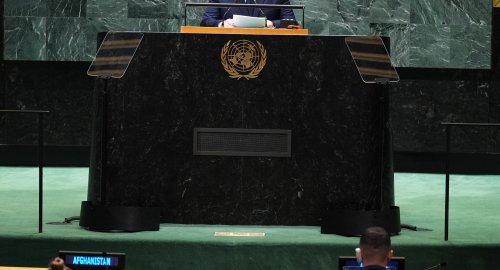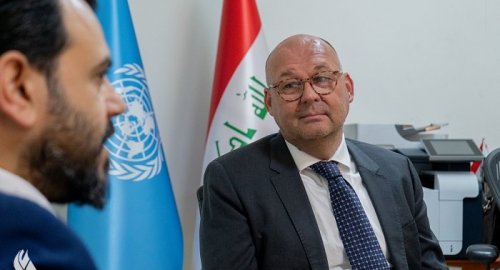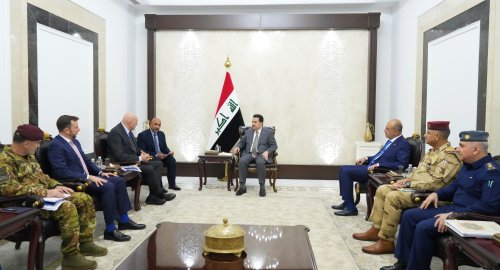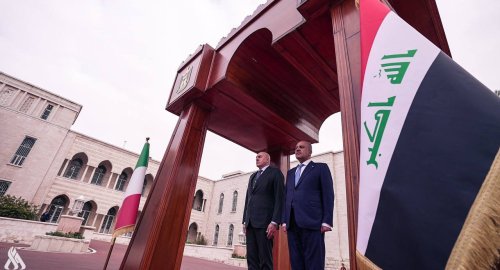
Key Points from Prime Minister Al-Sudani's Speech at the 79th Session of the United Nations General Assembly

- 27-09-2024, 07:00
Baghdad-INA
Prime Minister Mohammed Shia' Al-Sudani emphasized that halting the violations occurring in Palestine and the region is a collective responsibility. He also pointed out that Iraq is currently implementing a comprehensive reconstruction and development plan, considering Iraq's election to chair the Group of 77 and China as a victory for productive diplomacy.
Below are some Key Points from Prime Minister Mohammed S. Al-Sudani's Speech at the 79th Session of the United Nations General Assembly, delivered Thursday evening:
The 79th session of the United Nations General Assembly is being held under dangerous circumstances in the Middle East.
The international system is facing a difficult test that threatens its very existence, rendering it unable to achieve its goals, including maintaining international peace, security, and human rights.
Today, we are witnessing unprecedented violations of international treaties and norms, and the sidelining of international institutions responsible for managing and organizing international relations and promoting peace and stability.
The absence of this responsibility leads to reliance on alternative measures, and the neglect of these institutions risks returning international relations to a state of chaos.
We must commend the courageous efforts of some figures leading these international institutions, including the UN Secretary-General. However, despite significant efforts, we still see a lack of effective influence.
Stopping the violations happening in Palestine and the region is everyone's responsibility, particularly the Security Council, which has failed to achieve its primary goal of maintaining international peace and security.
The Palestinian people are being subjected to aggression by an occupying military force, displacing millions, killing thousands, and enforcing collective starvation to exterminate the Palestinian people without any deterrent measures. The international community and its members have not fulfilled their responsibility to protect, as mandated by international law.
The occupation forces cites Security Council Resolution 1701 as a pretext for aggression against Lebanon, selectively applying certain provisions while ignoring other UN Security Council resolutions.
We are witnessing a brutal campaign of indiscriminate killings and the use of technology to carry out remote bombings, with no regard for innocent civilians.
The government and people of Iraq, under the guidance of the religious authority, stand with Lebanon as it faces aggression aimed at plunging the region into conflicts, which we had previously warned against. We will continue to provide assistance to help Lebanon overcome the impact of these attacks.
We highlighted the systematic targeting of international agencies and humanitarian organizations in the occupied territories, harming their personnel, including UN agencies such as UNRWA in Gaza.
The recent actions of the occupying power aim to threaten the stability of countries in the region by igniting a large-scale regional war.
Iraq hopes that the United Nations will achieve the objectives it was founded for, and we express our disappointment in the Security Council and the international system for failing to fulfill their duties.
There has been a significant increase in hate crimes and intolerance, and we are in urgent need of international cooperation to promote the spirit of tolerance, mutual respect, and combat hate speech, discrimination, and violence.
One form of hate speech is the growing phenomenon of Islamophobia, which undermines global efforts to achieve peace, security, and coexistence.
I call on the United Nations to make greater efforts to promote dialogue and understanding among different cultures and religions, and for world leaders and heads of international institutions to stand against religious intolerance and hatred.
Iraq is undergoing significant developments, and ten years after ISIS occupied a third of its territory, Iraq is now implementing a comprehensive reconstruction and development plan, reviving life in its cities.
We face many challenges in achieving economic, administrative, and environmental reforms and diversifying the economy.
We have made significant progress in security, defeated terrorism, and will soon mark this victory with a joint declaration alongside our allies and friends who supported Iraq in the fight against ISIS.
Our efforts are focused on strengthening Iraq’s democratic process and cementing the social contract and national unity.
We have organized provincial council elections, which had been delayed for 10 years, and we are preparing to hold elections in the Kurdistan Region of Iraq, with the Kirkuk elections being delayed since 2005.
Our efforts continue to strengthen the relationship between the Federal Government, the Kurdistan Regional Government, and local governments in the provinces, protecting the existence of minorities and ensuring their needs are met.
Our government’s five priorities are: creating job opportunities, improving services, reducing poverty, combating corruption, and implementing economic reforms.
The government aims to advance essential human resources and has made significant progress in building state institutions and enforcing the rule of law.
The government is working to activate the role of the private sector, address administrative inefficiencies, diversify income sources, reform the banking and financial sectors, and manage the energy transition while addressing the causes of social and economic unrest.
Iraq faces the dual challenge of over-reliance on oil revenues and limited economic diversification, resulting from decades of wars, economic sanctions, the dictatorial regime’s misguided policies, poor management, and the squandering of developmental human and material resources.
Improving governance, combating corruption, achieving digital transformation, and implementing e-government are among our top priorities, as they are crucial strategies for reducing corruption and ensuring good governance.
We call on the international community to support our efforts in recovering Iraq's stolen funds and in overcoming legal and legislative obstacles imposed by some countries, such as banking secrecy and restrictions on disclosing beneficial owners.
Iraq seeks to achieve regional security and stability through building constructive partnerships to tackle common challenges, emphasizing cooperation and mutual interdependence in a way that benefits all parties.
We are planning to launch initiatives that reflect regional economic integration and stability, including the "Development Road" project.
The "Development Road" project aims to position Iraq as a key regional hub for trade and transportation, connecting the Middle East with Europe through Iraq via a network of railways, highways, industrial cities, and linking Al Faw Grand Port with Europe through regional countries.
This project represents a crucial step in enhancing regional cooperation and integration, aligning with Iraq’s goals of rebuilding the economy and improving services.
Iraq faces severe environmental challenges, including climate change and desertification, which cannot be addressed without enhanced international cooperation.
Desertification leads to the displacement of millions in search of stability, exacerbating social and political crises.
We call for global solidarity to tackle environmental challenges and increase awareness of the importance of sustainable water resource management, adhering to the principle of shared and equitable responsibility among nations.
I express my gratitude to the United Nations for the support it has provided to Iraq over the past two decades, and we look forward to a new phase of cooperation beginning at the end of 2025.
We are working hard to build a better future for our upcoming generations and look forward to continuing our partnership with the international community to achieve this.
Iraq's election to chair the G77+China group in 2025 is a victory for Iraq’s productive diplomacy, aimed at achieving development goals, closing the technological gap between the Global North and South, and reforming the international economic system.
During our chairmanship of the largest international group, which includes 134 member countries, we look forward to working toward a more stable and just world where development opportunities are available to all people.
Our policy puts Iraq, its security, sovereignty, and prosperity first.
We are making progress in overcoming the legacy of past wars, dictatorship, and terrorism, and we are advancing in the reconstruction of Iraq, positioning our nation in the regional and international roles it deserves.
Weekly decline in the Gold prices
- Economy
- 06:32
US Central Command: We killed ISIS terrorist leader Abu Yusuf in Syria
- International
- 24/12/20
Liverpool compete with Real Madrid to sign Olympique Lyonnais star
- Security
- 24/12/19
ISC, ADX discuss Strengthening Economic Ties
- Economy
- 24/12/16
Iraq assumes presidency of Arab Investment Company’s Executive Board
- Economy
- 24/12/17












